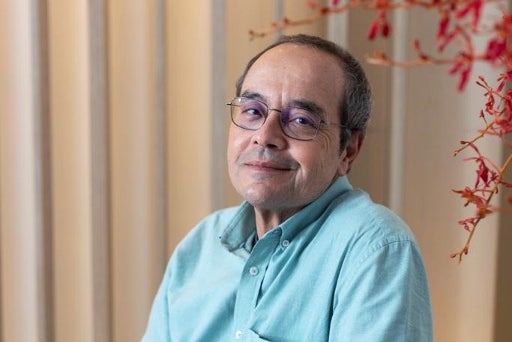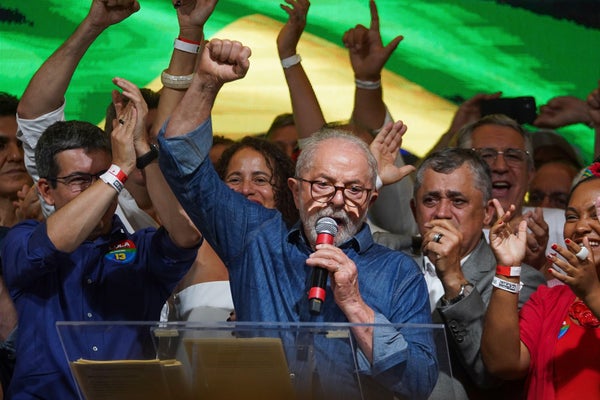Environmentalists are calling Brazil’s presidential election of Luiz Inácio Lula da Silva, popularly known as Lula, a big win for the Amazon rain forest. The ecosystem suffered record high levels of deforestation after the nation’s far-right president Jair Bolsonaro took office nearly four years ago.
Brazil contains more than half of Amazonia, a region whose fate is crucial to slowing climate change. During Bolsonaro’s tenure, loggers, cattle ranchers and soy farmers cut down or burned more than two billion trees in the Brazilian Amazon, many of them illegally, according to the Brazilian environmental research groups Imazon and MapBiomas. Scientists worry that the rain forest may be approaching a tipping point beyond which much of the region would change to dry savanna. Fewer trees have also meant less rain and higher temperatures for the Amazon region, enhancing drought.
Bolsonaro rolled back legal protections for the forest and its Indigenous inhabitants, and he opened the region to dam building and agribusiness expansion. By contrast, President-Elect Lula, who served two terms as president from 2003 through 2010, said during his campaign that preserving the rain forest will be one of his top priorities. “Brazil is ready to retake its leadership in the fight against the climate crisis,” he told supporters in a victory speech in São Paulo. “Brazil and the planet need a living Amazon.”
On supporting science journalism
If you're enjoying this article, consider supporting our award-winning journalism by subscribing. By purchasing a subscription you are helping to ensure the future of impactful stories about the discoveries and ideas shaping our world today.
How much can the new president accomplish after he enters office in January? Scientific American spoke with Paulo de Bessa Antunes, an environmental law professor at the Federal University of Rio de Janeiro and a former federal prosecutor in Brazil. He fought the Bolsonaro administration in the courtroom and has prosecuted many environmental cases.

Paulo Antunes. Credit: Courtesy Compos Mello Advogados Office
In the conversation, Bessa Antunes decried the lawlessness of the Bolsonaro years but said that Brazil has excellent environmental regulations and plenty of highly motivated people in its agencies who are ready to help Lula achieve his goals. Based on his faith in the law, Bessa Antunes seems genuinely optimistic about Lula’s chances for protecting Amazon forests.
[An edited transcript of the interview follows.]
Amazon deforestation decreased by an estimated 67 percent under the previous Lula administration. How will the challenges that he faces now be different?
Nowadays we have a strong commitment from various countries not to buy illegal timber, soybeans and beef. The modern sector of these industries in Brazil will be side by side with Lula because they know that otherwise foreign markets will be closed to them.
Does greater unity of the international community put Lulain a better position now than in his last tenure?
Yes, I think so. Brazil was once a world leader on environmental issues. Now I think other countries are feeling that “Brazil is back to the gate,” something like what happened with the Trump administration changing to the Biden administration. I see things as moving forward quickly now. Lula is also committed to creating a dedicated climate change agency that will be even better than the current structure we have, where climate change is under the umbrella of the environmental ministry.
Bolsonaro’s administration damaged the Amazon by ignoring a variety of illegal activities. Are government rules still in place that would allow Lula to improve control?
Bolsonaro tried to change some laws, but he faced opposition both in [Brazil’s] congress and in our supreme court. In 90 percent of the cases that went before the supreme court, the court ruled that the changes were unlawful. Brazil now has 29 percent of its land protected by environmental law, far higher than the world average. And that does not include the lands of Indigenous people, which are the best protected lands in Brazil.
But the powerful “ruralista” agribusiness lobby that fights for the expansion of soy and beef production remains. And Brazil elected a more conservative congress in October. How much of a stumbling block might this be to Lula’s environmental agenda?
Here’s the thing—money talks loudest of all. The agricultural sector depends on exporting its products abroad, so [that market] pressure is having a big impact. The mainstream of modern Brazilian agriculture understands that they need to adapt. You see that Simone Tebet, [a politician who is more conservative than Lula] who came in third in the first round of voting [for the presidential election], she’s now joined Lula [by endorsing him in the final election], and she is from Mato Grosso, an extremely agrodependent state. Lula is very skilled at arranging things with these people, at forging alliances.
During his campaign, Lula advocated for a green economy, including increasing environmental protection, subsidizing sustainable farming and reforming Brazil's tax code. Skeptics wonder how he will pay for this.
Brazil is a big country. It contains the most important environmental region in the world: the Amazon rain forest. Brazil is a green power. It’s completely different from nations like the U.S. and China. Our power is not weapons; it is the soft power of the environment. Once we have a trustworthy government with a clear program in place for protecting the environment, the money will come from carbon credits, from foreign aid. Maybe I’m too optimistic, but I think if Brazil can wield this power, it will bring money and green development.
Nevertheless, Lula also said he wants to develop infrastructure. How can that happen while preserving the forest?
Infrastructure is badly needed in the Amazon. Brazil is part of the ILO 169 convention [also called the Indigenous and Tribal Peoples Convention, 1989, an international legal instrument that establishes basic rights of Indigenous and tribal peoples]. As a means to comply with the convention, Lula can apply, in good faith, the “free and informed consent” of traditional communities and Indigenous peoples.
Indigenous people have lost rights under the Bolsonaro administration. For example, their lands have been invaded by gold miners and ranchers with impunity. How will this change?
Indigenous rights are written into the Brazilian constitution. Bolsonaro didn’t comply with these rights, but the rights existed. Lula has pledged to create a new ministry for the original peoples that will raise the level of the protection in Indigenous areas. [An Indigenous] person will be at the head. This will make a huge difference. The previous agency FUNAI [National Indian Foundation] was hugely underfunded under Bolsonaro.
Are you worried that some of the states remain under right-wing leaders? How much do states control environmental policy?
The U.S. is more rooted in the power of the states. In the Brazilian federation, the union is the main player. The states are very dependent on the central government. Yes, you have some right-wing state governments. But they have to align with the federal government, which they need to function. One of the first meetings that Lula will have is with all the governors. He’ll say, “Listen, tell me what your needs are.” And there will be bargaining: “I will give you what you want if you give me what I want.”
Does Brazilian public opinion support preserving the rain forest?
In big cities like São Paulo the population is committed to protecting Indigenous people, to protecting the Amazon—there is no question. In the Amazon itself, there are two different ways of looking at this. One is from traditional communities and Indigenous communities: these people are fully committed to protecting the environment. There are other people who think that environmental protections work against the economic progress of the region. But this kind of thinking, in my opinion, is in the minority. A message will be sent to all of the illegal actors. It won’t be the [whole] solution to the problem, of course, because it is very complicated problem. What we need for the Amazon is to provide the means for people there to survive, to fulfill their basic needs. The people in the Amazon are very poor. They will support more environmental protection if we can ensure them a better life.
Does the political instability of recent years, with one president being impeached and another gutting environmental regulations and encouraging lawlessness, give you pause?
I’m a realistic optimist. After all this recent political chaos, our society is a little more mature and understands that we need stability. We’ve seen that even in the people who supported Bolsonaro. When Lula won, the president of Brazil’s Chamber of Deputies [essentially] said, “Well, Lula is the next president.” The president of the senate said the same thing. The political elite understand that if we keep struggling all the time, we’ll go nowhere. Lula will bring stability because he has a big alliance, basically everyone except for the far right. We will have a national unity government. The future is likely to be good if we keep on this path. I think Brazilians understand this.
